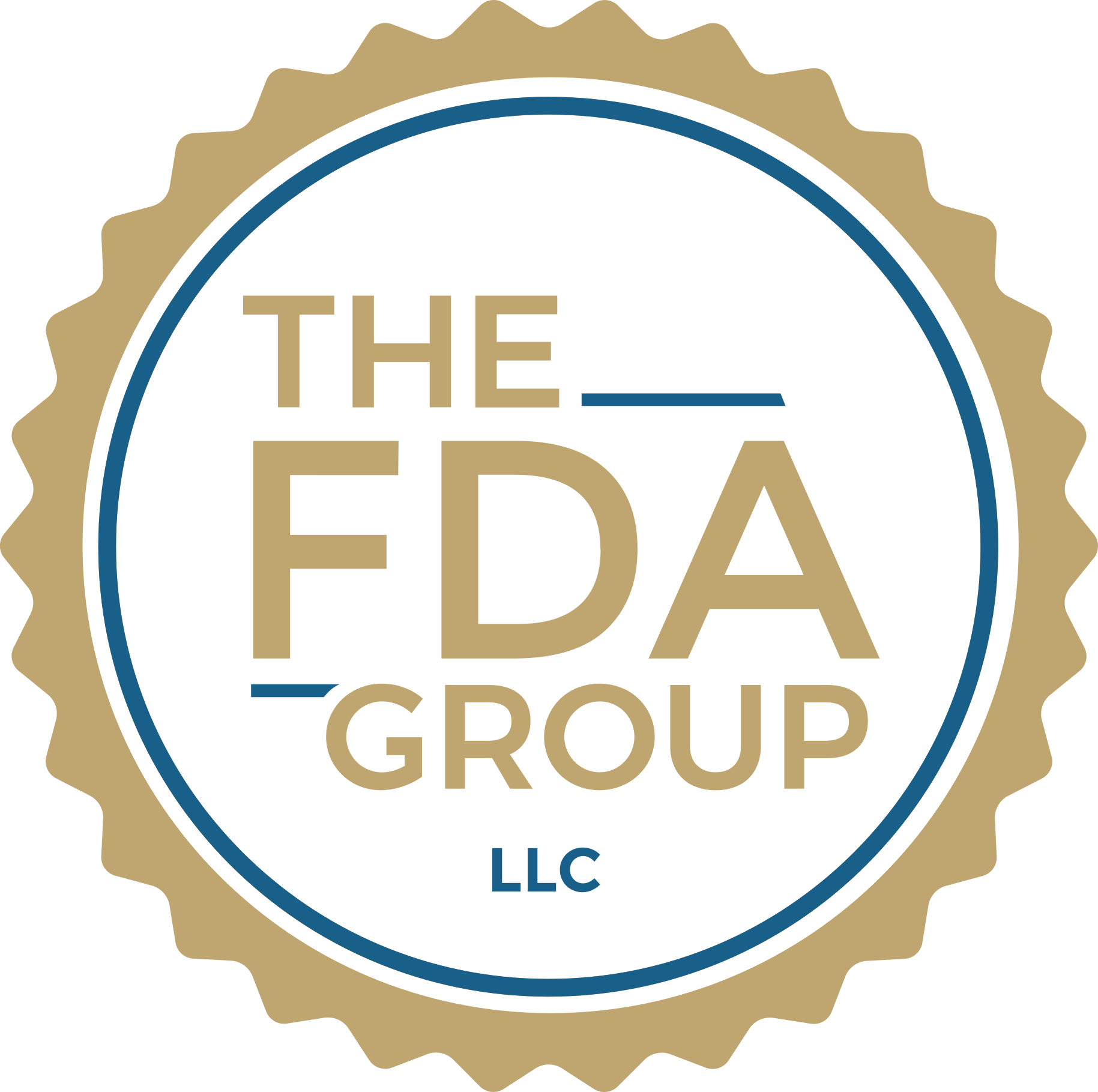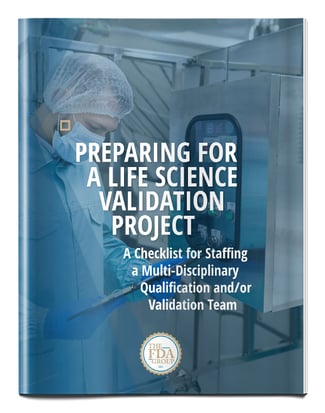Life science specialists are relied upon to plan, implement, and monitor Qualification and/or Validation activities in highly regulated industries such as pharmaceutical and medical device manufacturing.
These projects and programs—which may include activities like measuring and analyzing processes, auditing and calibrating equipment, and/or creating a document trail to demonstrate that processes lead to a consistent, high-quality product—are central to producing safe and effective products in a fully compliant state.
The practice of using multi-disciplinary teams to support Quality System activities including the Qualification and/or Validation of new or modified facilities, systems, and processes has become a cGMP expectation of the FDA as well as many other regulatory agencies in ICH markets.
In addition to drafting and executing protocols, effective Validation teams also ensure that any changes made to systems, equipment, or processes do not result in compliance or quality gaps.
The Value of Validation Consultants in the Modern Life Science Product Lifecycle
Carrying out effective Validation strategies across all stages of a product lifecycle—from research and development, to manufacture and distribution, or throughout a period of change—continues to be among the top challenges for life science companies.
Since Validation projects can vary widely in scope and complexity, each specific project needs to be evaluated in order to determine the resources and technical disciplines appropriate for anticipated tasks.
While some Validation activities can be resourced with internal resources, many require augmenting staff with outside talent who can bring experience and specific expertise to bear. By building a Validation team that can apply personal experience with the same or similar types of projects, department and company leaders can better ensure thoroughness and accuracy while also completing them on time and on budget.
Here, we help you find just such a professional. Finding, evaluating, and securing the right talent for a specific Validation project can be a challenge. We’ve broken down some significant qualities and abilities to look for in a candidate and compiled them into an easy checklist below.
While each project brings unique needs, use the following criteria to identify what is most important in a resource based on the Validation needs in front of you.
Need to resource your next Qualification and/or Validation project? We connect you with the top talent you need to plan and execute projects on time and on budget. Learn more about our Commissioning, Qualification, and Validation services, and contact us today to plan and execute projects on time and on budget.
1. Unit Operations Expertise
Filling, Packaging, Assembly, Specific Eq., CSV, Controls, etc.
Determine if, and to what degree your project will require highly specialized support. Is direct equipment or process experience critical or valuable? While direct equipment experience is generally easy to gauge from a CV, process experience often has to be further scrutinized to understand if a specialist can support the specific operation relevant to your needs.
It may be helpful to “bucket” the specific operations in which you’ll need support and use them to guide your questioning while interviewing candidates.
For example, a pharmaceutical manufacturer may need specific operations support in these specific areas:
- formulation,
- equipment/component preparation,
- final filling, and
- inspection and packaging.
Defining these buckets for your specific project is helpful in both assessing candidates for specific capabilities, and once your team is built, ensuring you have the expertise to support those areas.
Key Questions
- Which specific operations will you need to support?
- What skills, capabilities, or experience are essential to ensuring those unit operations can be adequately supported?
2. Specific Requirements for Products
Cell Culture, High Volume, Low Volume, Device, etc.
It’s important not to overlook any particular requirements related to the product, and or equipment that, if not accounted for, could result in a specialist working with a set of product or equipment requirements they’re not familiar with.
While everything about a particular candidate may otherwise look like a perfect match, the fact that they don’t have direct experience with a specific piece of processing equipment, for example, may make them ineligible.
Determine all the relevant requirements related to the product and or equipment and to what degree a specialist should be experienced with them.
Key Questions
- What are the specific requirements for the product, equipment, or project in question?
- What specific qualities, capabilities, or experience must a specialist have to satisfy these requirements? For example, is previous sterile room experience critical?
3. Environmental Requirements
Aseptic, Non-Aseptic, BSL, Cyto/Gen Toxic, etc.
Similar to product requirements, does the project or program require the Validation team to operate within a restricted environment? Do they need to be gown qualified with years of experience? Even if not a critical trait, would it be beneficial in a meaningful way?
Here and elsewhere, it’s important to ask questions that explore what are often short, over-simplified bullet points on a CV.
If a specialist lists themselves as having performed EMPQ support, for instance, probe further to understand what that means in terms of tangible project work. More importantly, determine which questions you need to ask in order to understand how they apply the experience within the context of your project.
This is one area where routine Validation projects with more general requirements differ from specialized process work where specific experience may play a larger role.
Key Questions
- What specific environmental requirements apply for the product or project in question?
- What specific qualities, capabilities, or experience must a specialist have to satisfy these environmental requirements?
4. Vision Inspection Systems
Defect sets, Defect logs, Personnel Qualification, etc.
Some Validation projects may require specialists who have specific experience with vision inspection systems.
This type of expertise can sometimes be difficult to find—even more so when the need is highly specific and necessitates knowing the requirements of an area for validating camera systems.
Key Questions
- What specific inspection equipment are you looking to validate?
- What are the internal requirements for the system?
- Do you have defect sets needed to validate such equipment?
5. Strong Documentation Skills
GMP-compliant documentation, protocol generation, etc.
Can the specialist actually write and execute protocols? If the project involves drafting and executing documents, specialists must be able to produce documentation that complies with both internal SOPs and externals regulations.
This is an area where backgrounds or experience are not well documented and often times not clear on a CV. While there are many talented C&Q professionals, it’s not a given that they have personal experience navigating the rigors of creating compliant documents that are genuinely clear and easy to follow.
While it may seem obvious, at this level, it needs to be abundantly clear that a potential candidate can create a clear and actionable protocol—especially if they will be placed in a long-term role where this is a key part of the work.
Key Questions
- What is the expectation for specialists in terms of protocol drafting and execution?
- What is the training process required prior to gaining access to the internal documentation control system?
- Will the specialists be required to initiate and drive change controls?
6. Specification Review
FRS, URS, SMDS, Criticality Assessment, etc.
Although this will be specific to the project at hand, it’s important to clearly and thoroughly understand the relevant specifications and how they will impact the team.
This will help to ensure the team is fully capable of meeting project expectations.
For example, if a piece of equipment was designed with a CIP system capable of 95% surface contact, as demonstrated by riboflavin spray coverage testing, and the expectation is to achieve 100% during Validation, how will that impact the project and the requirements from the team?
Key Questions
- Which specifications are relevant to the project or program?
- What specific qualities, capabilities, or experience must a specialist have to perform a thorough review?
- Will the specialists be required to initiate and drive change controls?
7. Company-Specific Training Requirements
Onboarding Process and Time, Specific Systems to be Used, etc.
Lastly, we’ve included a series of items that are too often missed: onboarding processes, training, and the time commitments associated with them. Many projects require a team to be built and deployed as soon as possible. But how much onboarding and training stands in their way beforehand? If it’s a month, this has to be planned for accordingly.
Don’t assume that incoming personnel will take the initiative to ask what they must to do get up to speed before beginning the project work.
This should always be clearly planned and presented by the organization ahead of time. Putting the onus on an incoming specialist to figure it out and ask questions on their own invites the risk of something not being addressed when it needs to be, potentially delaying project timelines.
More generally, make sure your project is in sync with relevant routine training schedules and other logistical details.
Key Questions
- Which training and onboarding activities will be needed for this specialist before they can begin work?
- Have you accounted for training and onboarding in your budget?
- Are project timelines realistic given the amount of time needed for training and onboarding?
Once again, this checklist is by no means intended to cover anything and everything related to your specific project or program.
It’s simply intended to point your attention to the major areas of consideration when staffing your team with external talent
Join the thousands of companies executing their Commissioning, Qualification, and Validation projects with The FDA Group.
Need third-party project or resourcing assistance to support Commissioning, Qualification, and/or Validation activities? We provide the expertise and capability you need to fill any role or complete any project no matter which phase it's in. Contact us today and get the conversation started.
We work with our clients to develop scalable resource plans to support validation efforts throughout the project lifecycle. Whether it is drafting protocols to execution and compilation of data packs, our resources have you covered. Learn more about our services here.
- Validation Master Plans (VMPs)
- Design Qualification (DQ)
- Installation Qualification (IQ)
- Operational Qualification (OQ)
- Performance Qualification (PQ)
- Equipment Validation
- Software Validation
- Process Validation
We provide service and support via three engagement models: consulting projects, staff augmentation, and FTE recruitment.
Preparing for a Life Science Validation Project
Download our free white paper and take this guide with you. Use the questions as checklist items you can adapt and deploy to plan your next project.


